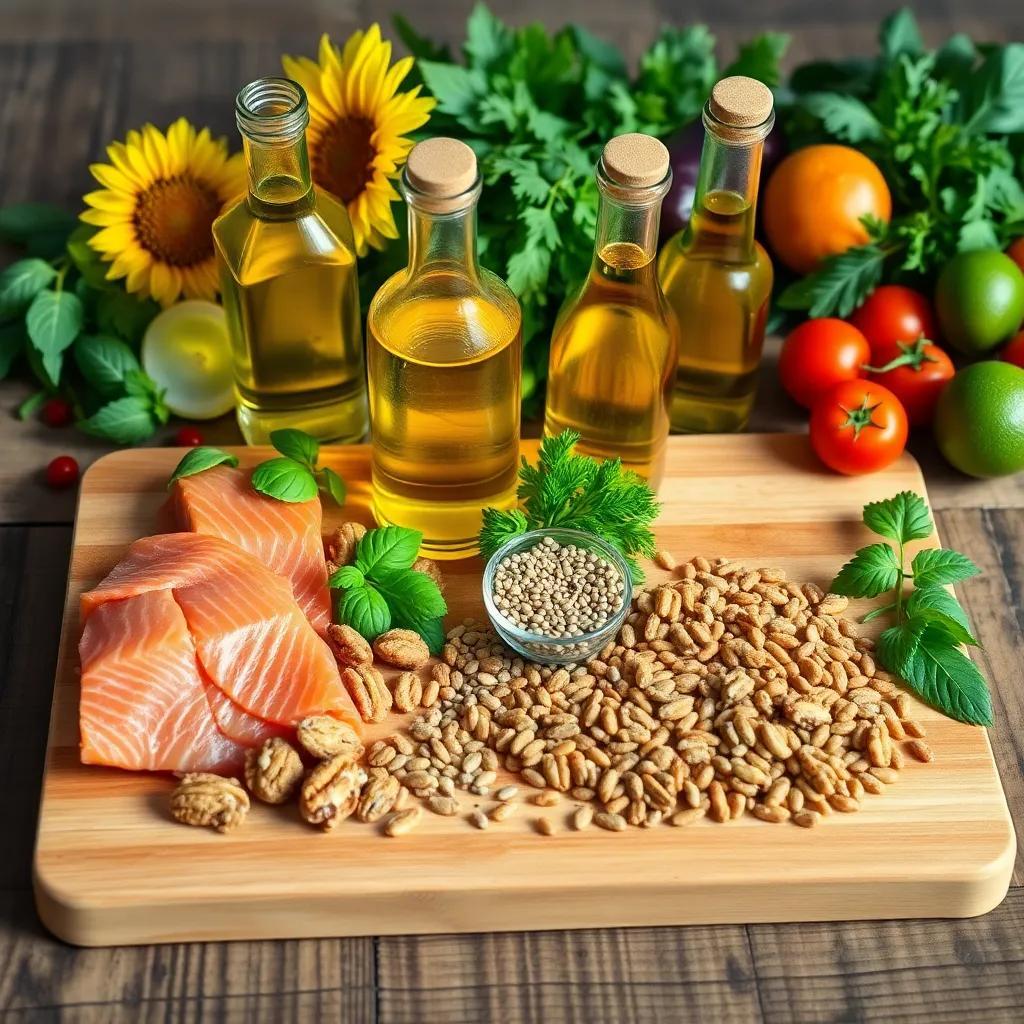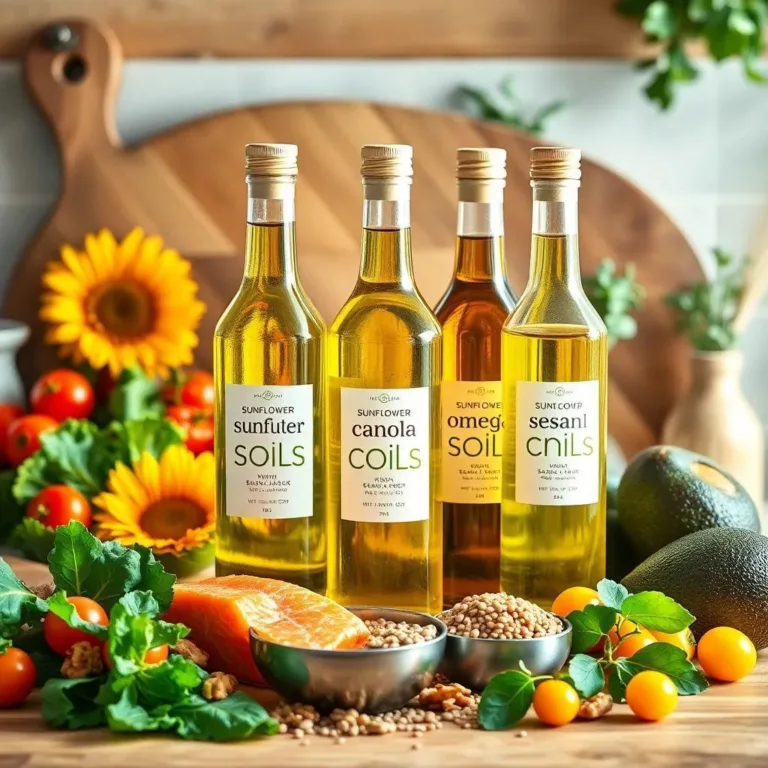Have you ever wondered how the oils we use in cooking could affect our health? From heart health to gut balance, those little bottles on our kitchen shelves might hold more power than we think! Join me as we explore the fascinating world of seed oils, their impacts, and how to make the best choices for a healthier, happier you!
Understanding Seed Oils and Their Health Risks
When I think of seed oils, I picture a rainbow of bottles lining the grocery store shelves. From sunflower to canola, these oils can seem like innocent players in our kitchens. However, are they really as healthy as they seem? Let’s take a closer look at some of the health risks associated with seed oils!
What are Seed Oils?
Seed oils are extracted from various seeds and are often used in cooking and food production. They include popular choices like:
- Sunflower oil
- Soybean oil
- Corn oil
- Safflower oil
While these oils have become staples in many kitchens, they can also be a bit of a double-edged sword!
The Omega-6 Dilemma
One major concern with seed oils is their high content of omega-6 fatty acids. While our bodies need these fats for various functions, an overabundance can lead to serious health issues. When our diets are overloaded with omega-6, especially from seed oils, they can create an imbalance with omega-3 fatty acids. This imbalance may lead to increased inflammation in the body, which is linked to conditions like heart disease, obesity, and even autoimmune disorders! It’s the chaos of the fatty acids!
Takeaway: Moderation is Key!
So, what’s the best approach? It’s pretty simple! Enjoy seed oils, but moderation is critical. Balance your diet by including plenty of omega-3-rich foods, such as:
- Fatty fish (like salmon or mackerel)
- Walnuts
- Chia seeds
- Flaxseeds
By making small adjustments, you can minimize the health risks associated with seed oils while still enjoying your delicious meals!
Balancing Omega-6 and Omega-3 Fatty Acids
Let’s talk about balancing those two important players in our diet—omega-6 and omega-3 fatty acids! Think of them as the dynamic duo of nutrition, but when one overpowers the other, things can get a bit messy!
Why Balance Matters
You might be wondering, “Why is this balance so important, anyway?” Well, I’m glad you asked! When we consume too many omega-6s, which are commonly found in seed oils, and not enough omega-3s, it can lead to unwanted inflammation. It’s like having too much ice cream and not enough cake at a birthday party—something essential is missing!
Ideal Ratios
The ideal ratio of omega-6 to omega-3 fatty acids is thought to be around 4:1. However, many of us have ratios that are more like 10:1 or even 20:1! This skewed ratio isn’t just for fun—it can lead to various health problems. So, how can we get our balance back? Here are a few friendly tips:
- Embrace Omega-3 Rich Foods:
– Add fatty fish (like salmon and sardines) to your meals.
– Snack on walnuts or mix chia seeds into your yogurt or smoothies.
- Limit Omega-6 Sources:
– Cut back on processed foods, which often use seed oils.
– Choose healthier cooking oils, like olive oil or avocado oil.
- Learn to Read Labels:
– Check the ingredient lists and nutrition facts to make informed choices!
As I like to tell my friends, layering your meals with a variety of healthy fats can be both delicious and beneficial! By focusing on balance, you’re not only treating your taste buds but also improving your overall health. So, let’s aim for that perfect ratio and keep our meals yummy and balanced!

Seed Oils and Their Impact on Heart Health
Heart health is something I take seriously! I’m sure you do too! So, let’s chat about how seed oils can influence our hearts. While seed oils have been marketed as heart-friendly options, there’s more to the story!
The Omega-6 Connection
Most seed oils, like corn and sunflower oil, are high in omega-6 fatty acids. Now, don’t get me wrong—our bodies need these fats. But too much omega-6 without enough omega-3 can throw our bodies out of whack. This imbalance can lead to inflammation, which isn’t great for our cardiovascular system!
Here are some things to consider about seed oils and heart health:
- Increased Inflammation: Excessive omega-6 can raise inflammatory markers.
- Blood Lipid Changes: An imbalance might lead to higher LDL (bad cholesterol) and lower HDL (good cholesterol).
- Risk Factors: These changes can increase the risk of developing heart disease over time.
Making Heart-Healthy Choices
So what can we do? Fortunately, there are ways to enjoy cooking with oils while keeping our hearts happy! Here are my tips:
- Choose Wisely: Opt for oils with a better fatty acid profile, like olive and avocado oil. They come packed with monounsaturated fats, which are heart-friendly!
- Mind Your Portions: If using seed oils, do it in moderation. A little goes a long way!
- Add Omega-3 Foods: Incorporate more omega-3-rich foods into your diet, such as salmon, walnuts, and chia seeds.
Keeping my heart healthy doesn’t mean I have to give up delicious foods! By being mindful about oil choices, we can savor life while supporting our hearts!
Managing Weight with Seed Oil Consumption
Let’s face it—managing weight can feel like a roller coaster ride! With so many foods out there, it’s easy to overlook the effects of cooking oils. When it comes to seed oils, they can be sneaky little culprits in weight gain if we’re not careful!
Understanding Calorie Density
Seed oils are high in calories, which means they pack a punch in the calorie department. Just a little oil can add up quickly! Here’s how seed oils can influence weight:
- Caloric Intake: Oils are calorie-dense, and too much of them can push our daily calorie intake over the edge.
- Fat Storage: Excessive consumption of omega-6 fatty acids may promote fat storage in the body.
- Hunger Signals: Research suggests that diets high in omega-6 might not keep us feeling full as effectively as those rich in omega-3.
Tips for Weight Management
So, how can we keep our weight in check while enjoying the flavors of seed oils? Here are some friendly suggestions:
- Portion Control: Be mindful of how much oil you use. A good rule of thumb is to start with a small amount and adjust as needed. Maybe try using a spray bottle for some light coverage?
- Mix It Up: Use various healthy fat sources in your meals, such as avocados, nuts, and fatty fish. This keeps things interesting and nutritious!
- Cooking Methods Matter: Try grilling, baking, or steaming instead of frying. You’ll use less oil and keep your dishes lighter!
By being aware of how seed oils can affect our weight, we can enjoy our meals while staying on track with our health goals!
Promoting Gut Health: Best Practices with Oils
I often find myself thinking about gut health and how it affects my overall well-being. It turns out, the oils we choose can play a significant role in keeping our gut happy! Let’s explore how to promote gut health while using oils in our cooking!
The Gut Microbiome Connection
Our gut is home to trillions of microorganisms that help with digestion and immune function. But guess what? The type of fats we consume, particularly from seed oils, can influence this delicate balance.
- Omega-6 Effects: High consumption of omega-6 fatty acids may disrupt the gut microbiome, leading to imbalances.
- Diverse Gut Flora: A diet rich in whole, unprocessed foods can support the growth of beneficial bacteria.
Best Practices for Gut Health
Here are some friendly practices to promote gut health while indulging in cooking with oils:
- Balance Fatty Acids: Focus on achieving a balanced ratio of omega-6 to omega-3 by including more omega-3-rich foods, like salmon and walnuts, in your diet.
- Choose Healthier Oils: Opt for oils that have a more favorable fatty acid profile, such as olive oil. This oil is known for its gut-friendly properties!
- Emphasize Fiber: Combine healthy oils with a diet rich in fiber from fruits, vegetables, legumes, and whole grains. These foods nurture beneficial gut bacteria!
- Stay Hydrated: Drinking water and staying hydrated is vital for supporting digestion and maintaining a healthy gut.
By incorporating these practices into my daily routine, I’m not just making my meals tasty but also supporting my gut health! Remember, our gut is our foundation, so let’s treat it well!

